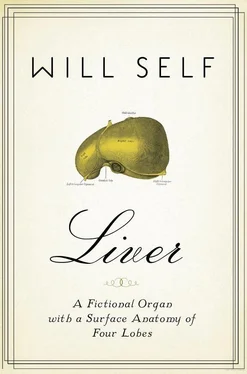Understanding very well that timing was everything, Bolton, thorough professional that he was, constricted his range and enormously increased the speed of his delivery. The result was — to paraphrase Coleridge — that listening to him was like reading the index of the A — Z , while someone kept flicking a lighter that obstinately refused to ignite.
‘SeriousadverseeventsinhepatitisCtrialsincludedneuropsychiatric disordersseriousandseverebacteriologicalinfectionsbonemarrow toxicitycardiovasculardisordershypersensitivityendocrinedisorders autoimmunedisorderspulmonarydisorderscolitispancreatitisand ophthalmologicaldisorders.’
As this babbling of side effects went on, nobody noticed the flight feathers curled round the edge of the plywood door, fresh as paint. The griffon vulture sidled in along the wall, her buff wing coverts rasping against the bamboo-patterned flock. She hopped up on to the piano keyboard, her talons striking the opening chords of Chopin’s Marche Fune`bre — music oddly appropriate for an anti-retroviral advert.
The griffon hopped up again and, biding her time, pecked the Prince Consort’s sightless eyes. She didn’t have long to wait: the Martian was reaching the end of his thirty-five seconds of enlightening, his pointer, tipped with a ball of green lightning, poised over Epimetheus’s carbonated liver. The vulture flapped down and came barrelling through the audience of drinkers. Hilary swung his hornbill towards her beak. ‘Blimey!’ he exclaimed. ‘Who’s this birdy cunt?’
It was too late for Epimetheus, for, with the crazyological cutting of a TV advert, the vulture grabbed his liver in her talons, then, taking off across the bar-room, smashed through the sash window, swooped along Blore Court, banked into Berwick Street and began to climb over Raymond’s Revue Bar, up into the contusion of the London night.
It was to be a civilized drink to discuss the future of their relationship — if it had one. The venue: the champagne bar at the Savoy; here, among solid leather footstools, there would be no footsie. Then, at the final hour, Athene is overpowered by the wanting of him, so calls and suggests that Prometheus come instead to her father’s huge penthouse apartment, high above the river at Vauxhall.
He takes the call while watching a financial services advert on cab TV; he’s on his way from the City, where he’s been making a pitch for another such. Making it alone, because Epimetheus has been getting flakier and flakier in the past fortnight: dead scalp on the padded shoulders of a clerk in the offices of a building society. Perhaps.
‘Oh. OK,’ Prometheus says, ‘but what about your old man?’
‘He’s in Zürich seeing his bankers. I’ve sent the staff away for the night and the doorman’s stoned on qat.’
She’s thought of everything — except how she’ll feel when, for the first time since his boudin noir body was fed into the ambulance, she sees Prometheus. He’s so tanned, so planed, so pivoting on the moment, that all the lines she rehearsed, sitting at her dressing table clipping on Bulgari and spraying Clive Christian No. 1, evaporate. She was going to say, ‘It’s drugs, isn’t it?’ Because nothing else could begin to explain his total collapse, followed a few hours later by a blithely apologetic call assuring her he was ‘on the mend’. At the time, Athene hated him as much as the cliché; but, instead of remonstrating with him, she says, ‘I want to tell Zeus about us.’ A thought not arrived at until precisely now, for she’s in thrall to her father and knows no other life than the lifestyle that goes with compliance to his whims. Athene is used to wealth — swims in it like an element, and has no understanding of its true clagginess.
Prometheus says, ‘I’m shocked; I’d assumed I was only a bit of rough for you.’ He moves towards her, his trainers soundless on the dark marble with its liverish veins and swirls.
Zeus’s penthouse is enormous; its twenty-foot-high windows imprison within their dark aquaria the big oily fish — Rothkos, Trougets and Freuds — that are mandatory catches for the ultra-rich. The fossilized trunk of an ancient hardwood rears up out of an equally ancient Japanese basin, its sinuous boughs embracing the plush atmosphere. Zeus’s interior decorater convinced him this feature would ‘bring the outside in, to integrate the domestic with the natural’; but what it actually does is to demonstrate that most of us are doomed.
Prometheus takes Athene in his arms, his hands in her warm hand-holds, and presses his cheek to hers. ‘I want to be with you, too,’ he says, although his mind is racing ahead. Where will we live? He sees an ugly Victorian house in Wandsworth, the sheet of grey paving in front of it punctuated by the commas of dog turds, a recycling bin hooked over the railings, evidence of a repetitive task that is all the more Sisyphean for its pretension to virtue. He sees Athene, grown plump and ordinary and matronly, no longer a fabulous deity, only another upper-middle-class woman, a function of her taste and her credit rating: a target group of one.
‘I want to be with you, too,’ he reiterates, ‘and we’ve gotta talk, but — ’ He twitches, and his skin tightens, sensing the vulturine approach, and he wonders if this, also, could be accommodated in Wandsworth. ‘First I’ve gotta use your loo, I’m busting.’
Athene wriggles out from him, frowning. He waggles the half-empty bottle of Zeus mineral water, and she points the way down a malachite passage to the third door on the gauche.
In the oasis, a clear pool beckons to Prometheus from between ferny fronds. He looks for Polynesian beauties offering him half coconut shells brimming with milk — then remembers this was a chocolate advert in his childhood. There’s no window in the bathroom, only the ceaseless moan of aircon. Prometheus frantically dithers, caught between the demands of bladder and vulture. He succumbs, unzips, relieves himself, then, using his inner Ariadne, he makes his way through a maze of smaller passageways to the service entrance, where he finds the griffon vulture already waiting for him, a superior look first in one yellow eye, then the other.
Farce ensues as Prometheus tries to smuggle the giant bird back to the toilet so that she can feed on him in peace. He has to hurry — he’s been gone a while and Athene is bound to be suspicious. The vulture isn’t helping, uttering peremptory feeding cries — pig grunts, goose hisses — as she butts at his thigh.
They gain the toilet and are about to go in, when there’s Athene, her amethyst eyes flashing, the words ‘It’s drugs, isn’t it?’ expiring on her ruby lips.
Prometheus stretches out the wings of his jacket, attempting to hide the scavenger; the griffon defeats his efforts by stretching out her own wings. Prometheus hustles right and hustles left, as if this two-step can obscure the vast span of feathers, the bony brow, the delving beak. ‘So,’ Athene says redundantly, ‘it’s not drugs.’
‘No,’ Prometheus begins. The urge is upon him to explain the griffon vulture away — to riff, to spiel, to sell himself — but for once he’s tongue-tied and can only mutter, ‘It’s not drugs.’
‘I should’ve guessed!’ she spits. ‘Your stupid Greek name.’
‘I am Greek’ — he paused — ‘ish.’
And there it was: he had subsided into a simpler past, and so discovered a different, more honest, eloquence. ‘She comes,’ he explained, ‘most days, and feeds. Obviously, I feel. like shit the next day, but then my liver — it grows back.’
‘Regenerates.’
‘Yeah, that. And when it does I feel better than ever, every time. Stronger, cleverer, too — more able to win pitches — bigger pitches with bigger spends. The first time she came I won the Zephyrcard account from your — ’ He faltered.
Читать дальше












